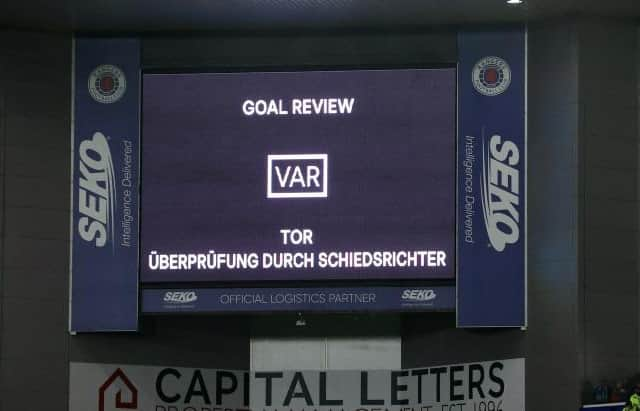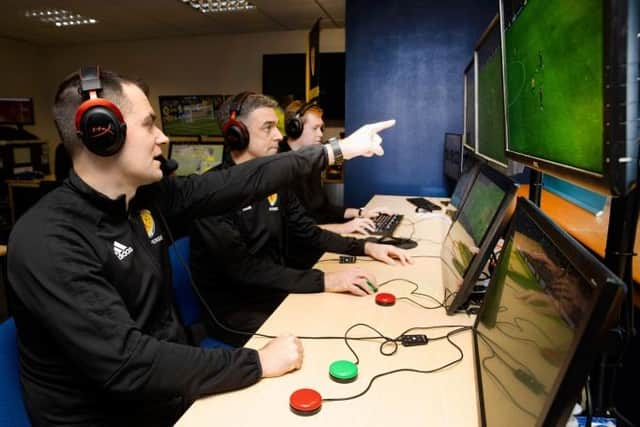VAR technology to be introduced in Scotland before World Cup as SPFL consider plans to accelerate roll-out date
and live on Freeview channel 276
VAR technology could be introduced in Scotland before the World Cup in November after SPFL officials put plans in place to accelerate the roll-out date several weeks ahead of schedule.
The 42 SPFL member club’s voted unanimously in favour of implementing the new technology back in April, with Scottish Premiership clubs set to pay between 5.63% to 16.29% annually on a sliding league table scale depending on their finishing positions last season.
Advertisement
Hide AdAdvertisement
Hide AdSFA chief executive Ian Maxwell stated last month that his own preference would be to bring VAR into Scottish football “as soon as we possibly could do it.”


According to the Scottish Sun, Head of Referee Operations Crawford Allan addressed the issue of fast-tracking VAR’s introduction at yesterday’s SPFL annual general meeting.
However, several logistical issues are still to be addressed, ensuring the technology will not be in place for the start of the 2022/23 domestic season a week on Saturday.
GlasgowWorld understands the SPFL hierarchy want big screens and monitors for broadcast partners in place to allow VAR decisions to be communicated as they take place.
Advertisement
Hide AdAdvertisement
Hide AdAs a result, that will provide supporters inside stadiums or fans watching on from home with an idea of the decision-making process as it happens.
All 12 Premiership clubs are now expected to have the necessary kit in place within their grounds before the league is halted for the Qatar World Cup this winter.
Several VAR trials have been carried out across lower league games in Scotland in recent months, with SFA category 1 referee Nick Walsh confirming earlier this year “all SPFL officials are nearing the end stages of VAR training.”
Who is expected to pay?
Premiership clubs will pay the following percentage of the full cost given their 2021/22 finishing positions:
1st CELTIC - 16.29%
2nd RANGERS - 11.67%


3rd HEARTS - 10.03%
4th DUNDEE UNITED - 8.81%
5th MOTHERWELL - 8.21%
6th ROSS COUNTY - 7.61%
7th LIVINGSTON - 6.97%
8th HIBERNIAN - 6.69%
9th ST MIRREN - 6.38%
10th ABERDEEN - 6.08%
11th ST JOHNSTONE - 5.63%
12th KILMARNOCK (promoted from Championship) - 5.63%
How will it work in Scottish football?
Advertisement
Hide AdAdvertisement
Hide AdThe SFA system will mirror what is already used in competition run by governing body FIFA, with the same principle of “minimum interference, maximum benefit.”
VAR can be expected to intervene in seven key areas:


1 - For penalty box decisions/penalty kick or possible penalty kick offences.
2 - For goals scored - all goals scored, and the build up to the goal being scored, are checked under VAR.
3 - For straight red card offences, such as violent conduct and the denial of an obvious goal scoring opportunity.
Advertisement
Hide AdAdvertisement
Hide Ad4 - For serious misapplications of the laws - such as a goal scored direct from a dropped ball or throw in.
5 - For cases of mistaken identity.
6 - At the taking of a penalty kick and at kicks from the penalty mark (e.g, for encroachment or goalkeeper moving from the goalline).
7 - For serious missed incidents in matches.
How will it affect the standard of officiating in Scotland?
Scotland’s SFA match officials have been training for over 18 months on how to officate with the assistance of VAR, which is currently being used across a number of Europe top leagues.
The technology raises the accuracy of important decisions from a reported 92 per cent to 99 per cent.
Advertisement
Hide AdAdvertisement
Hide AdReferee’s in Scotland are often faced with public scrutiny after getting a key decision wrong, with many fans building a case for conspiracy against their club.
VAR will help to solve that problem, which will limit the number of times officials think about how they may have affected the result of a game by a crucial mistake.


Lowering controversy might be relatively straightforward with the new technology but there remains a culture problem in Scottish football whereby referees are widely viewed as an easy target for abuse.
That needs to change quickly. The vast majority of referee’s in Scotland are part-time and that is unlikely to change according to Crawford Allan.
Advertisement
Hide AdAdvertisement
Hide AdHe admitted the costs involved in luring them away from their day jobs and their dedication to training ensures there is almost nothing referee’s can do to improve their standard of officiating.
However, VAR will help to release pressure on referees and limit the amount of abuse they receive from the stands.
Comment Guidelines
National World encourages reader discussion on our stories. User feedback, insights and back-and-forth exchanges add a rich layer of context to reporting. Please review our Community Guidelines before commenting.
